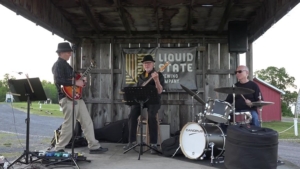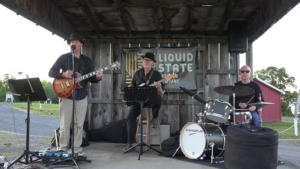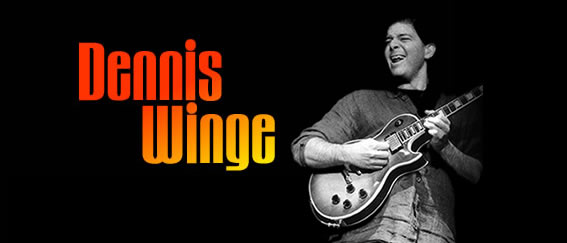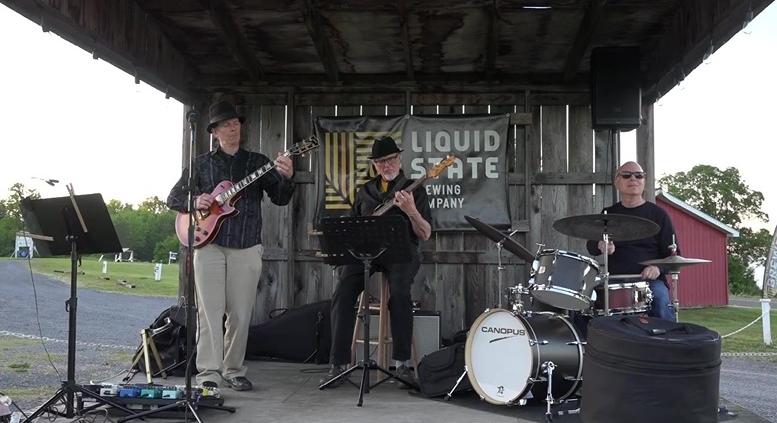Reflections on Receiving My First Public Criticism
/in Blog Posts/by denniswingeRecently, my band Blue Train posted a cover of Cream’s “Crossroads” on YouTube. The performance received a comment that, when translated from German, reads: “Sounds completely clumsy; it makes you realize what you had in the original. Maybe you should start by adding some simpler blues numbers to the setlist. You’re covering a piece by three top-notch instrumentalists—they didn’t achieve world fame for nothing.” (The “original” that is being referred to in the comment can be heard here.) This feedback, while initially surprising, has led me to reflect deeply on my approach to music, particularly when covering such iconic songs.
The Criticism and My Response
Receiving my first public criticism felt like a badge of honor. Criticism, especially when constructive, is an integral part of an artist’s growth. The fact that this critique came in German added an unexpected punch, reminding me of the global reach of music and its universal impact. However, beyond the initial sting of the comment, I saw an opportunity to articulate my philosophy as an improvising musician.
articulate my philosophy as an improvising musician.
As an improvising musician, my primary goal is integrity. To me, integrity means being genuine to the music and to oneself. Being genuine to the music involves respecting the stylistic elements that define the song while allowing room for personal interpretation. It’s not about replicating the original note-for-note but rather paying homage to the past masters while infusing the performance with one’s own voice. This leads to the second aspect: being genuine to oneself. It’s essential to assimilate the influences of mentors and masters but also to push the music forward, showcasing one’s unique artistic vision.
Our Performances vs. Cream’s Original
The original version of “Crossroads” by Cream, recorded live at the Winterland Ballroom and featured on their “Wheels of Fire” album, is celebrated for its raw energy and technical brilliance. Eric Clapton’s solos in this performance are often regarded as a pinnacle of rock guitar artistry, displaying impeccable phrasing and dynamic build-ups. Clapton, Jack Bruce, and Ginger Baker each brought their virtuosity to the song, creating a powerful, improvisational synergy.
Interestingly, Clapton himself has expressed mixed feelings about the recording, suggesting that some aspects didn’t meet his standards. Despite this, the performance remains a benchmark in rock history, inspiring countless musicians. Cream’s live performances varied significantly, with some versions of “Crossroads” being less polished than the one that made it to the record. This variability highlights the essence of live music—genuine, spontaneous, and sometimes rough around the edges.
In our performance of “Crossroads,” we were not attempting to replicate Cream’s version. The beauty of music, especially in a live setting, lies in its spontaneity and the unique interpretation each artist brings. Unlike Cream, who played this song numerous times on tour, my band had never played it before and did not rehearse it extensively. This spontaneity, while potentially resulting in a less polished performance, is a testament to our commitment to genuine musical expression.
The Value of Criticism & Moving Forward
The critical comment we received serves as a reminder of what is important in music. While technical perfection and polish are admirable, they are not the sole determinants of a meaningful performance. Integrity, sincerity, and the ability to convey genuine emotion and creativity are equally, if not more, important. Our performance may have seemed clumsy to some, but it was an honest representation of our musical journey and our respect for the original while also infusing it with our personal touch.
to convey genuine emotion and creativity are equally, if not more, important. Our performance may have seemed clumsy to some, but it was an honest representation of our musical journey and our respect for the original while also infusing it with our personal touch.
Criticism, whether positive or negative, is an opportunity for growth. It encourages reflection and reassessment of one’s artistic goals. For Blue Train, this means continuing to prioritize integrity in our music, embracing both the polished and the clumsy aspects of live performance. It’s about honoring the music we cover while also staying true to our unique artistic voice.
In conclusion, I welcome criticism as a vital part of the artistic process. It helps clarify what is truly important in music: integrity, authenticity, and the courage to express one’s unique vision. As we continue our musical journey, we will take these lessons to heart, striving to balance respect for the originals with our own creative interpretations. And to the commenter, thank you for your feedback—it has sparked valuable reflection and reaffirmed our commitment to genuine musical expression.



